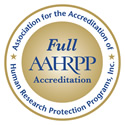UConn Health’s Human Subjects Protection Program (HSPP) has earned reaccreditation from the Association of Human Research Protection Programs, Inc. (AAHRPP). AAHRPP is an independent, non-profit accrediting body created to ensure that HRPPs across the nation meet rigorous standards in their policies, procedures, practices, and protections. 
“AAHRPP is the gold standard,” says Michael Centola, associate vice president for research integrity at UConn Health. “As programs, we are required to abide by regulations. This accreditation shows that our program meets standards that are higher than what is required.”
HSPP oversees all research at UConn Health involving human subjects and their data. This broad range of activity includes clinical, bio-medical, social-behavioral, and retrospective research; clinical trials for drugs or devices; psychiatric research; research involving children; industry-sponsored evaluation of investigational drugs; internally funded research initiated by faculty; and two institutional review boards (IRBs).
AAHRPP reaccreditation is a lengthy, multi-step process much like what hospitals undergo to be reaccredited. A lot of preparation goes into the submission process, which takes about two years, says HSPP administrative manager Julia Blair.
The first phase includes a self-evaluation of all procedures and the preparation of a roughly 1,000–page application document, which Blair’s office submitted in June 2023. A site visit by AAHRPP followed in March 2024, during which evaluators talked to researchers and research staff.
“It’s a lot of folks participating in our process and contributing to our success in this effort,” Blair says. “It’s a team effort.”
Anything flagged by evaluators must be addressed. But, in the case of UConn Health, no concerns were noted. In fact, the AAHRPP report held up the UConn Health HSPP as an example of how things should be done, noting a long list of strengths that included engaging with community-based organizations, consultations between researchers and the community about potential research projects, and use of surveys and other instruments to ensure that researchers were meeting the communities’ requests and needs.
“What that says is that UConn Health takes the protection of human subjects very seriously,” says Centola. “Institutions accredited by AAHRPP must have systems in place for participants, recording requirements, outreach and education for participants, and even conflict of interest committees — guardrails to ensure that anyone with a conflict of interest is appropriately managed.”
Stakeholders include faculty, staff, IRB members, and members of the Scientific Review and Conflicts of Interest Committees, Office of Clinical and Translational Research Services, Sponsored Program Services, Research Pharmacy and Research Safety, and many others.
Centola praised Blair and her team for driving the many steps of the reaccreditation process to a successful conclusion. Issued in June, the final report from AAHRPP grants UConn Health HSPP full reaccreditation for five years. The program received its first three-year accreditation in 2006 through the leadership of then-HSPP director Dr. Richard Simon and has consistently achieved five-year reaccreditations in the years since.
“Dr. Simon guided us all those years,” says Blair. “Given his commitment to high standards, we were not surprised our program successfully attained reaccreditation once again.”



